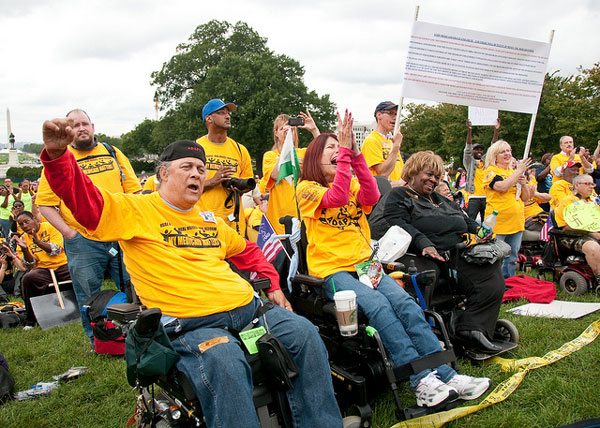
July 26, 2017; Disability Scoop
Home- and community-based services allow people with disabilities to live outside institutions. That Medicaid cuts that would strip individuals of their freedom are up for consideration is appalling, and disability advocates have been taking noticeable action by staging die-ins resulting in dozens of arrests. Sixty-four people were arrested on Tuesday in the atrium of the Hart Senate Office Building on Capitol Hill.
Activism among people with disabilities is not a new phenomenon, but it seems to be receiving increasing attention in recent days as the proposed healthcare bill would result in sweeping Medicaid cuts, essentially eliminating in-home services for persons with disabilities.
“Today, a majority of senators ignored the pleas of their constituents and moved ahead with debating disastrous health care proposals that will result in people losing health care coverage and threaten the Medicaid home and community-based service system. All roads from this vote are bad for people with intellectual and developmental disabilities,” said Peter Berns, CEO of the Arc, a nonprofit that promotes and protects the human rights of people with intellectual and developmental disabilities
Sign up for our free newsletters
Subscribe to NPQ's newsletters to have our top stories delivered directly to your inbox.
By signing up, you agree to our privacy policy and terms of use, and to receive messages from NPQ and our partners.
The Republican health care acts have been called “an assault on people with disabilities.” The current proposal would change Medicaid’s payment system from one based on patient need to a per-capita payment to the states. States would receive a set payment for each Medicaid enrollee, regardless of how much money they need to spend on recipients, incentivizing states to spend less per enrollee. As healthcare costs shift from the federal government onto states, cuts would be required for states to remain afloat. As home- and community-based services are often made available through state Medicaid waivers, these are likely to disappear as the funding is cut.
This means that people with disabilities who rely on hired caregivers for assistance with daily living tasks such as taking medication, eating, and bathing will no longer receive these services in their homes. They would be forced to live in residential care, which not only has worse outcomes for persons with disabilities, but also costs more, and violates the Supreme Court’s Olmstead decision, which mandates service delivery in the least restrictive environment possible. Furthermore, people with disabilities are twice as likely to live in poverty. That means that even those who don’t require home- and community-based services are threatened by funding cuts.
Given the dire situation persons faced by with disabilities and their loved ones, it comes as no surprise that ADAPT has staged protest after protest and will likely continue to do so until people with disabilities are able to access the services and programs they need. Earlier this week activists chanted, “I’d rather go to jail than die without Medicaid.” People with disabilities are fighting as if their lives depend on it, because they do.—Sheela Nimishakavi













